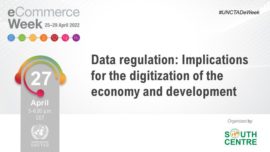eCommerce Week 2022: Data governance, 28 April 2022
UNCTAD eCommerce Week 2022: Data and Digitalization for Development
Exploring a global framework for data governance
Organized by South Centre and IT for Change
28 April 2022, 5-6.00 PM (CET)

UNCTAD eCommerce Week 2022: Data and Digitalization for Development
Exploring a global framework for data governance
Organized by South Centre and IT for Change
28 April 2022, 5-6.00 PM (CET)

UNCTAD eCommerce Week 2022: Data and Digitalization for Development
Data regulation: Implications for the digitization of the economy and development
Organized by South Centre
27 April 2022, 5-6.00 PM (CET)

STATEMENT OF THE CHAIPERSON OF THE SOUTH CENTRE BOARD, THABO MBEKI: COUNCIL OF MEMBER STATES, 24 FEBRUARY 2022
Once again the health, economic and social crisis caused by COVID-19 forces us to hold this meeting virtually. The deterioration of the situation in developing countries, to which I alluded two years ago, has only worsened. The gap between the countries of the North and the global South has widened. The lack of solidarity and selfishness of the countries of the North has led to the inequality in access to vaccines that we all know today.
If COVID-19 has taught us anything, it is that we must completely rethink the value we place on the health sector. The billions needed to prevent and respond to health crises are nothing compared to the billions lost in business closures, job losses and economic paralysis that are the cost to the global economy of a health emergency like the COVID-19 pandemic.
The South Centre, in this second year of the pandemic, has continued to adapt and innovate in its ways to support and accompany developing countries in this challenging context.
A bigger global role for China?
By Martin Khor
China seems to be preparing to play a bigger role in global economic affairs, but not at the cost of giving up its developing country status. After years of being rather low key in economic and social affairs at the United Nations, it looks as if China is now ready to upgrade its role in the future. (more…)
New Threat to Economic Role of the State
By Martin Khor
The economically successful developing countries are characterised as having a strong “developmental state”. But this role of the state is coming under attack in new global rules being created. Two new trade agreements involving the two economic giants, the United States and European Union, are leading a charge against the role of the state in the economy in developing countries. Attention should be paid to this initiative as it has serious repercussions on the future development plans and prospects of the developing countries. (more…)
Development-led Globalization Requires De-colonizing the MDGs
By Manuel Montes
The big attraction of the eight Millennium Development Goals (MDGs), or at least the first seven of these, was their near universal acceptability. It mobilized both resources and politics, both nationally and internationally, in pursuit of reducing poverty, hunger, gender inequality, malnutrition and disease.
50 years of Development Planning in Africa: Retrospect and Prospects
By Carlos Lopes
A new era of development planning is emerging in Africa, says the new head of the UN Economic Commission for Africa, in this wide-ranging review. He gave this opening speech at the 50th anniversary conference of the African Institute for Economic Development and Planning (IDEP).
Post-2015 Development Agenda and Sustainable Development
By Yılmaz Akyüz
The United Nations’ Post-2015 Development Agenda should not simply extend MDGs, or reformulate the goals, but focus instead on global systemic reforms to remove main impediments to development and secure an accommodating international environment for sustainable development. This is a big, ambitious agenda which cannot be acted on overnight. An action plan for systemic reforms could be supplemented, but not substituted, by specific goals in some areas of economic and social development. This paper was presented to a brainstorming workshop of the G77 and China held in the UN in New York in February.